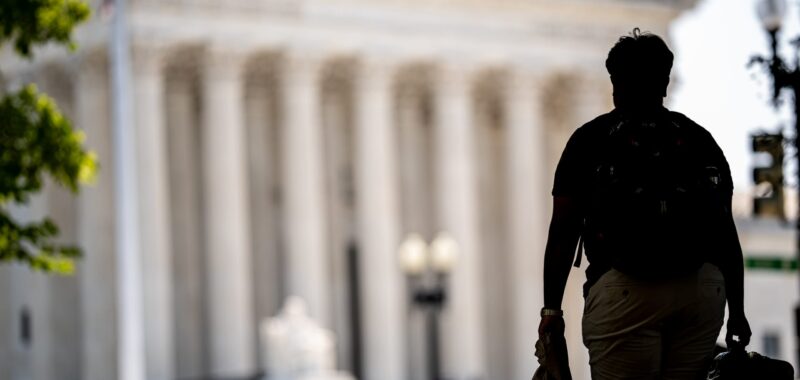The Supreme Court is visible on July 29, 2024 in Washington, DC. In an op-ed in The Washington Post, U.S. President Joe Biden laid out his proposed reforms to the Supreme Court including 18 year term limits for Supreme Court Justices and a new code of ethics for the court ahead of a speech tonight at the Lyndon B. Johnson Presidential Library in Austin, Texas.Â
Andrew Harnik | Getty Images
The U.S. Supreme Court declined on Monday to hear a conservative challenge to job protections for the leaders of the federal consumer product safety watchdog in a case that would have given the justices a chance to reassess a 1935 precedent that limits a president’s ability to fire certain agency heads.
The justices turned away an appeal by plaintiffs led by the conservative group Consumers’ Research of a lower court’s ruling upholding the protections involving the U.S. Consumer Product Safety Commission, an independent agency within the federal government‘s executive branch.
The 1972 federal law that established the agency makes its five commissioners removable only for “neglect of duty or malfeasance,” not at the whim of a president, as lawmakers sought to insulate it from presidential control. The plaintiffs sued the agency, arguing that this law violates the U.S. Constitution’s principle of separation of powers among the government’s executive, legislative and judicial branches.
The suit was brought after the agency denied information requests filed under the Freedom of Information Act by Consumers’ Research and a second plaintiff in the case, a Texas company called By Two.
Lawyers for Democratic President Joe Biden’s administration had urged the Supreme Court to turn away the appeal, arguing that the plaintiffs lacked the required legal standing to sue the agency and that their claims are foreclosed by Supreme Court precedent.
Texas-based U.S. District Judge Jeremy Kernodle, appointed to the bench by Republican former President Donald Trump, in 2022 ruled in favor of the plaintiffs, finding that these job protections violated the Constitution’s Article II, which states that the “executive power shall be vested in a president of the United States of America.”
On appeal, the New Orleans-based 5th U.S. Circuit Court of Appeals reversed Kernodle’s ruling. The 5th Circuit upheld the legal shield in place for commissioners of the consumer protection agency under the Supreme Court’s 1935 ruling in a case called Humphrey’s Executor v. United States.
In that case, the Supreme Court found that a president does not have unfettered power to remove commissioners of the U.S. Federal Trade Commission, faulting then-President Franklin Roosevelt’s firing of an FTC commissioner for policy differences.
The current Supreme Court, with a 6-3 conservative majority, has taken an expansive view of presidential powers in recent years and has shown skepticism toward broad authority for federal agencies. This case gives the conservative justices a chance to rein in or depart from Humphrey’s Executor.
The challenge led by Consumers’ Research has drawn support from 11 Republican U.S. lawmakers including Senator Ted Cruz and Representative Darrell Issa as well as the Republican attorneys general of 16 states, and various conservative and libertarian groups.
Consumers’ Research on its website asks people to report “woke” actions by companies, saying, “Many corporations are putting progressive activists and their dangerous agendas ahead of customers.” It also opposes the ESG (Environmental, Social, Governance) investing principle that puts a premium on environmental and issues, and corporate governance.

